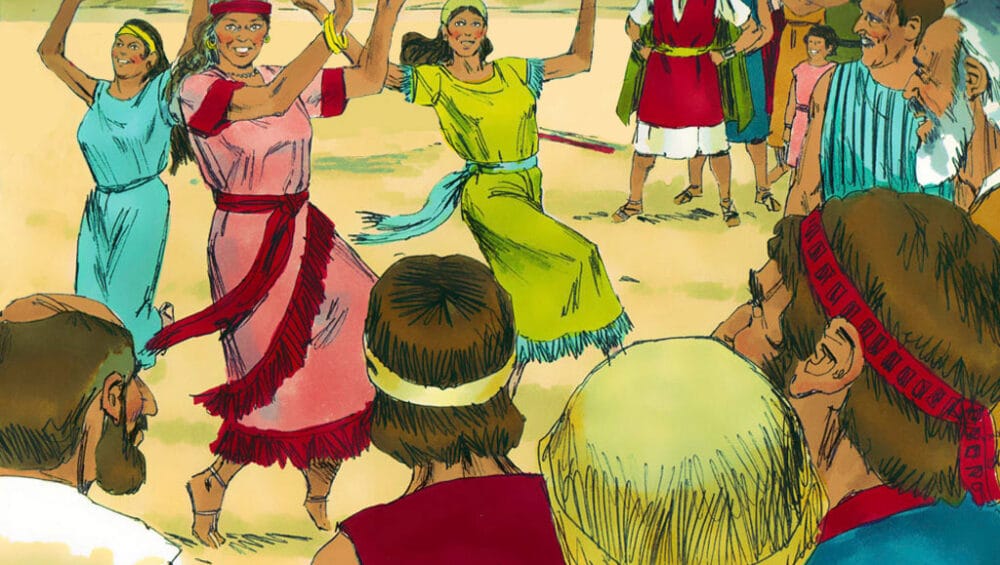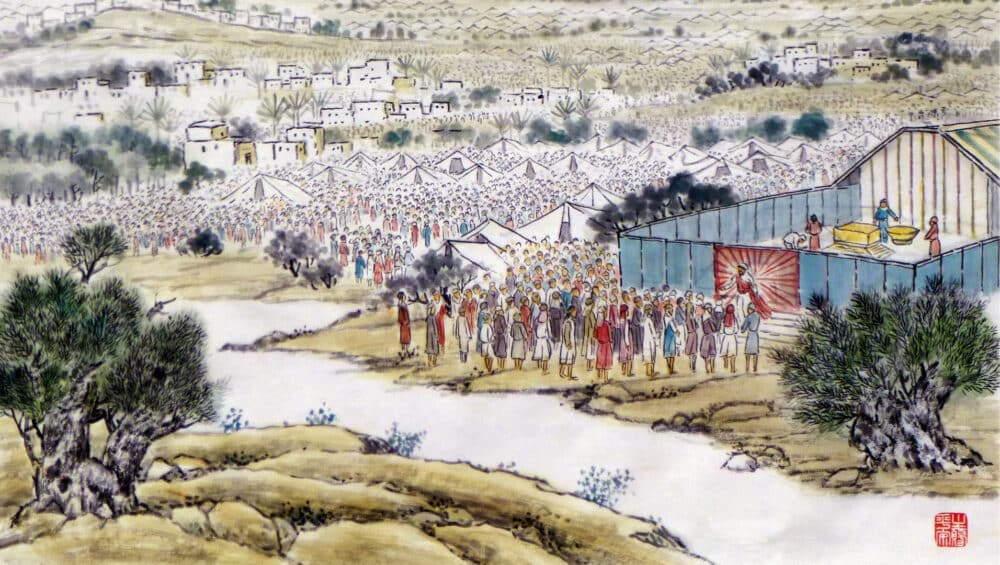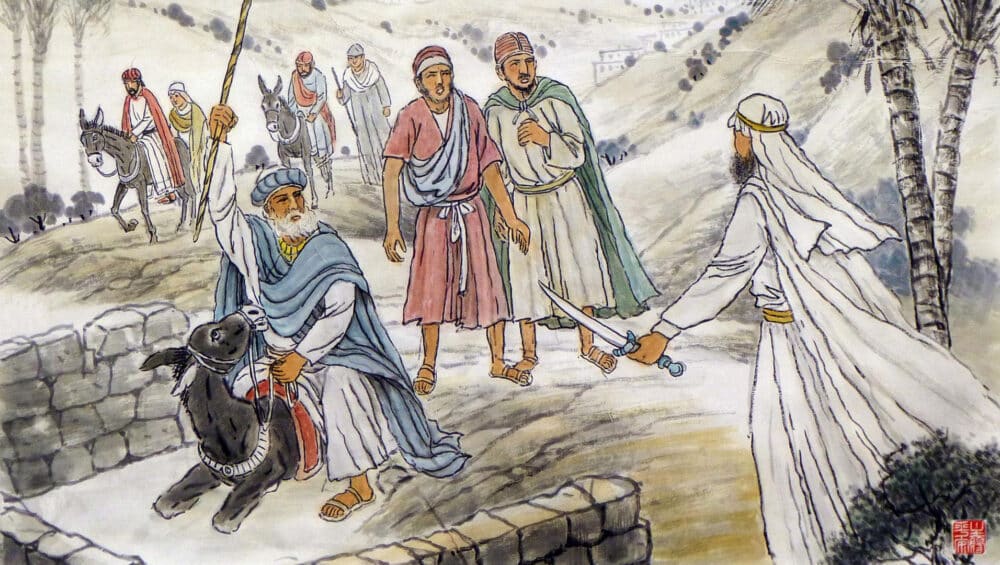Welcome to Livin’ Light’s Bible-In-A-Year challenge of discovering God’s love for us and His purpose for our lives. Here is the format for this great adventure: The daily reading assignment is posted at 5 a.m. After each day’s reading, Leigh An Coplin, the blog host, shares observations and poses questions about difficult passages to Rob Fields, who studied Christian Education at Asbury Seminary and currently teaches Biology in the Orlando area. To start from the beginning, click on 365 Bible Readings and scroll down to Day 1. The reading schedule is taken from The One Year Chronological Bible NLT.
Today’s Reading
— Ruth 1-4:12
For background information on Ruth, go to http://www.biblestudytools.com/nlt/ruth/
(1140 BC) Click here for a timeline of the entire Bible.
Questions & Observations
Q. (Ruth 1:2-3): Haven’t we talked about the Israelites battling the Moabites before? If so, then why didn’t Elimelech find another place that was fertile?
A. The Moabites, we are told in Genesis 19, are descendants of Lot, and therefore close relatives of Israel. The story seems to imply that he knew something about the good land and crops there during the famine. It appears he considered it an acceptable alternative to Israel. Israel and Moab have fought some and will again (2 Kings 3), but they appear to be on good terms at the time of this story. Don’t forget, the period of the judges takes place over a long period of time.
Q. (1:13): Was it fair for Naomi to say that the Lord raised his fist against her?
A. I guess that’s a matter of opinion, but at this moment in her life, it certainly felt that way to her. The death of her husband and sons would have been devastating to her prospects of survival. There would have been absolutely no one to take care of her, and she likely knew — wrongly as it turned out — that her family line would die with her. Watch for her speaking differently about God by the end of the story.
O. (2:1-23): In my opinion, Naomi was bold to say the Lord has been raising his fist at her. But, maybe she is just being honest that God is testing her. She obviously strongly believes in Him because she praised God for the kindness Ruth received from Boaz.
Q. (3:7-9): I find it strange that someone would go to sleep on a pile of grain. And, I guess by lying at his feet, Ruth would show that she is indebted to him for his kindness, but it also must signal that she is asking him to take care of her? Can you explain the uncovering of feet and the meaning of this scene?
A. During harvest season, the harvesters would spend the evenings in the fields to guard the crops they were processing from theft overnight. It was also a time of celebration, which likely would have involved feasting and probably some alcohol consumption — the use of “good spirits” in 3:7 probably means he was a bit drunk. But your guess is correct: this scene is both a request for care and, more importantly, a proposal of marriage that is being initiated by Ruth. She is asking Boaz to be her kinsmen-redeemer, and the easiest way for him to do so as a man of wealth was to marry her.
Q. (4:5): It seems very important for the people of these times to carry on their family name. It is important to many people today, but normally no relative would “take over” the husband duties and be humble and give them the name of the deceased. Can you talk about the importance of carrying on a family name in these times?
A. Family is prized above everything else in this society except God. The societal expectation was that you would do anything to ensure the survival of a “branch” on your family tree, including marrying a widow of a family member and declaring that any children produced from the marriage were the children of the dead relative.
Q. (4:11): I love the honor that is given here to Rachel and Leah. If you have been reading along, you would know that I have been taking the treatment and view of women personally. I don’t feel that God would have created women any less than men. But, in the Bible there is such abuse of women — not all, there are a lot of positive Scripture too — that is very hard for me to accept. It seems that any negativity that comes to man is of his own demise or has nothing to do with being a man. Where women can be severely abused because they provide something men want, and in many cases, are treated as property. Their treatment is out of their control.
A. What you are describing is not just the way things were in the story of the Bible, but basically the way things were in the entire world until the modern era (though in places like Saudi Arabia, it continues to this day). And it’s not just women: children are treated just as much like property as women are. Men ruled the day, and even with the instructions in the Law that women were to be treated with respect and cared for, they often bore the brunt of oppression by men. But there’s a lot going on.
First, we must consider that we are 21st century readers looking back more than 3,000 years. It can be hard to get our mind around their treatment of women and children, but we must understand that we are NOT reading about the modern world. That the Law gave ANY consideration of women made it revolutionary for its time. Centuries later, that Jesus and Paul would speak of women (and children) as full participants in the Gospel was again groundbreaking and revolutionary.
As I look at Scripture as a whole, I see God at work in a fallen world. One of the rules in this fallen world is “might makes right,” and generally, men are the mighty ones, which allows them to exploit women and children. But even if this is what the Bible tells us, it does not mean that what happens to women is in any way ENDORSED by God; far from it! But God understands that human character does not change overnight, and so He works incrementally to bring about the change that He desires, changes that are seen most clearly in Jesus Himself. While modern Western society may desire to forget its “backward and sexist” Judeo-Christian roots, it is not a coincidence that Western society alone has offered the full rights and privileges that women enjoy today. Western society is centered around and built from the Church and her teachings, and one of the clearest teachings of the Bible is that women are made in the image of God just as much as men (Genesis 1:27) and women are an equal part of the Body of Christ (Galatians 3:28). Without the Church and her guidance, I highly doubt that women reach that equal status they enjoy throughout North America and Europe today (and I think the same argument can be made for slaves and other minorities, but that’s another story). It can be difficult to see things in this way, but part of me feels that God’s truth that all people are special to Him is most clearly seen in the way that the treatment of women in Scripture repulses us. If it breaks our heart, surely it breaks His. Praise God for the way that He has been able to guide our world in such a way that we have arrived at a place where women can truly be seen as full partners in the Kingdom of God!
Great answers!!! Hope to see you tomorrow!
For further study: What was a guardian redeemer? https://www.biblegateway.com/devotionals/quest-bible/0238/07/16?interface=print
Shop: God’s Word is a story of love for us! https://livinlight.org/product/deepest-love-t-shirt/
Tomorrow’s reading
— Ruth 4:13-22
— 1 Chronicles 2:9-55
— 1 Chronicles 4:1-23
— 1 Samuel 1:1-8









